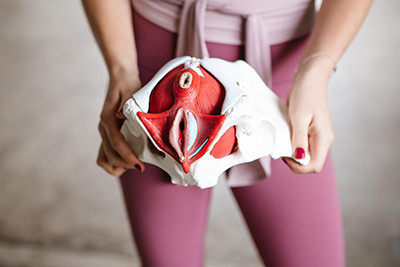Do you suffer from embarrassing bladder leakage whenever you laugh, cough or sneeze?Marketing and society has made us believe that leaking is normal,
especially if you’ve had children, and it is something we have to accept
Did you know that urinary incontinence is not normal?
Urinary Incontinence affects 200 million people worldwide. Twenty-five million of those people are Americans and 75-80% of those are women.What is Pelvic Floor ? The pelvic floor is a woven basket of muscles that hold your bladder, uterus and bowels.
The pelvic floor is a woven basket of muscles that hold your bladder, uterus and bowels.
The pelvic floor relaxes to allow us to urinate or have a bowel movement.
It contracts to stop the flow of urine, tightens the vaginal opening or prevents us from passing stool or gas.

Now there is a program which you can follow and help you to solve your problem of bladder leakage.
What is Pelvic Floor Strong?
Pelvic Floor Strong™ is an at-home comprehensive video system designed to effectively and safely strengthen the pelvic floor and core. Pelvic Floor Strong reveals simple concepts and gentle exercises that can be done any time, anywhere to stop your bladder leakage, tone your vaginal walls and belly, leaving you feeling confident, empowered and sexy.
You may want to learn about it by watching the video in the link provided here.
The Importance of a Strong Pelvic Floor: Say Goodbye to Embarrassing Bladder Leaks
Bladder leakage caused by laughing, coughing, or sneezing can feel embarrassing and frustrating. For many, this is a common issue that might be dismissed as "just a part of aging" or something inevitable after childbirth. However, let’s be clear: urinary incontinence is not normal, and you don’t have to live with it. A strong pelvic floor can help you regain control and confidence.
Understanding the Pelvic Floor
The pelvic floor is a group of muscles and connective tissues that span the bottom of your pelvis. These muscles support essential organs like the bladder, uterus (in women), and rectum. They play a critical role in controlling urination, bowel movements, and even sexual function.
When your pelvic floor muscles are weakened—due to aging, childbirth, obesity, or certain health conditions—they may fail to provide adequate support. This can result in stress incontinence, where sudden pressure on the abdomen (from laughing, sneezing, or coughing) leads to leaks.
Why Urinary Incontinence Shouldn’t Be Ignored
Many people normalize bladder leakage as a natural consequence of life events or aging. While it’s common, it’s not something you have to tolerate. Ignoring incontinence can affect your quality of life, leading to:
Social discomfort: Fear of leakage can make you avoid activities and interactions.
Emotional impact: Embarrassment and anxiety can affect mental health.
Health risks: Persistent incontinence may lead to skin irritation and infections.
Benefits of a Strong Pelvic Floor
Strengthening your pelvic floor muscles can address and prevent incontinence while offering additional benefits such as:
Improved Bladder Control: Stronger muscles help you hold and release urine effectively.
Better Posture and Core Strength: A healthy pelvic floor supports overall core stability.
Enhanced Sexual Wellness: Many individuals report improved intimacy and satisfaction with a stronger pelvic floor.
Prevention of Pelvic Organ Prolapse: Proper muscle tone helps keep internal organs in place.
How to Strengthen Your Pelvic Floor
Kegel Exercises: These are the most well-known exercises for the pelvic floor. To do them:
Identify your pelvic floor muscles by stopping urination midstream.
Squeeze and hold those muscles for a few seconds, then relax.
Repeat 10–15 times, several times a day.
Pelvic Floor Physical Therapy: A specialist can tailor a program to address your specific needs.
Yoga and Pilates: Many poses and exercises in these practices target pelvic floor strength.
Lifestyle Adjustments:
Maintain a healthy weight to reduce pressure on the pelvic floor.
Avoid heavy lifting that strains these muscles.
Stay hydrated but avoid excessive caffeine, which can irritate the bladder.
When to Seek Help
If you’ve been experiencing persistent bladder leaks despite your efforts, consult a healthcare professional. They may recommend advanced treatments like biofeedback, pessaries, or even minimally invasive surgery.
Conclusion
Urinary incontinence might be common, but it’s not something you need to accept. With proper awareness and proactive steps, you can strengthen your pelvic floor, reduce bladder leaks, and regain control over your life. Empower yourself to laugh, sneeze, and cough without fear—because your well-being matters.

